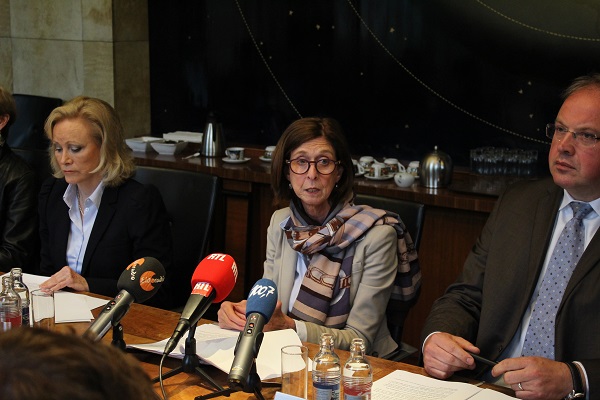
As part of the European Week against Cancer running from 25 to 31 May 2016 and culminating in World No Tobacco Day, Lydia Mutsch presented the status and progress of various plans and actions overseen by the Ministry of Health in the fight against the disease.
A major aim of the week is the promotion of the new European Code Against Cancer, developed by the WHO International Agency for Research on Cancer (IARC), which provides a dozen simple recommendations that can be followed by any and every citizen to help prevent cancer, with particular emphasis on healthy lifestyle and screening. According to the IARC, respecting all the points of the Code could prevent nearly one-third of all cancer-related deaths.
"For Luxembourg, active in the fight against cancer, three elements are essential in the context of prevention," explained the Minister of Health, Lydia Mutsch, before highlighting the three elements that have been integrated into the National Cancer Plan (2014-2018): "Do not smoke, avoid the misuse of alcohol and promote early detection through various screening programmes."
Implemented in 2014, many of the goals of the National Cancer Plan are being finalised, with Lydia Mutsch stating: "This ambitious plan aims to implement until 2018 no fewer than 73 actions grouped into 10 axes".
Priority 1: Governance in the Fight against Cancer
Among the major advances, the minister emphasised the first national cancer platform, effective for a year and a half, which directs all work plan implementation. The National Cancer Institute, founded in 2015, has also started work, such as developing recommendations for good practice in cancer treatment.
Priority 2: Promotion of Health against Cancer
Regarding the promotion of health, the plan against tobacco was reworked and a new version will be available in mid-June 2016. Tobacco remains a major cause of mortality in Luxembourg, where a law against smoking in covered establishments was only implemented in January 2014.
"In addition to smoking, alcohol misuse is still a little known cancer risk factor!" commented Minister Mutsch. A Luxembourg plan of action against the misuse of alcohol (PALMA) has therefore been developed and is currently being finalised. It primarily targets the responsible use of alcohol and the protection of young people faced with abuse.
Priority 3: Cancer Prevention
In terms of aspects of prevention, the minister cited the establishment of a radiological electronic book (CRE), containing the history of all medical imaging examinations carried out which would avoid the duplication of tests, to protect the patient from unnecessary exposure to ionising radiation. The book is in the technical development phase with the Agence e-Santé.
An information camapign has also been launched regarding the vaccination programme against HPV for young girls aged 11 to 13.
Priority 4: Early Detection of Cancer
The Health Minister welcomed the progress of the organised screening programme for colorectal cancer (PDOCCR) which will begin on 15 September 2016. Colorectal cancer is the third cause of premature death from cancer. "Through this programme we aim to significantly reduce the number of deaths from colorectal cancer," she stated.
More work is underway for the diagnostic component of the National Cancer Plan to reduce waiting time for results or in the treatment of cancer and provision of supportive care. A national multidisciplinary meeting concept (RCP) has been developed, aiming to offer every cancer patient the opportunity to present and discuss their case to determine the best therapeutic strategy.
In the fight against cancer, Luxembourg public health policy has a strong focus on prevention and early detection: "Cancer is not the biggest health problem in industrialised countries, and also in the Grand Duchy," the Minister recalled. "We estimate that each year about 3,000 people are diagnosed with cancer!"
Screening programmes have therefore been developed, such as the mammography programme, the HPV vaccination, the screening programme for colorectal cancer and the programme to prevent skin cancer. Cancer is the leading cause of death among men (34% in 2014) and the second among women (27% in 2014).
Meanwhile, smoking is the leading cause of premature death in the EU, leading the WHO and its partners to recognise "World No Tobacco Day" on 31 May each year to highlight the health risks related to smoking, which kills nearly 6 million people each year. More than 5 million of these people are consumers, whilst more than 600,000 are involuntarily exposed to second-hand smoke.
Around 1,000 deaths a year in Luxembourg are the result of tobacco-related diseases. "The new draft law transposing Directive 2014/40/EU on tobacco control is particularly important to target the entry period in smoking amongst youth, since 70% of smokers start smoking before the age of eighteen, and 94% before the age of 25," the Minister explained.
A new anti-tobacco law, announced in December 2015, enforces tighter restrictions on alternative smoking forms, prohibiting so-called "vaping" in the same places where the smoking ban applies to avoid the inhalation and emitting of undesirable toxic compounds. The law also prevents smoking or vaping at children's playgrounds, prohibits the advertising of electronic cigarettes, as well as cross-border trade via the Internet.
A new National Plan against Smoking 2016-2020 is also currently being finalised. This plan aims to prevent and reduce tobacco use and its morbidity by setting the following objectives:
- Offer the population an environment to prevent smoking and achieve long-lasting cessation;
- Protect young people and prevent them from starting smoking;
- Help people wishing to quit smoking to permanently wean themselves off tobacco;
- Acquire better knowledge and regularly assess the steps performed.
Top photo by MSAN; Bottom photo by Shutterstock.








